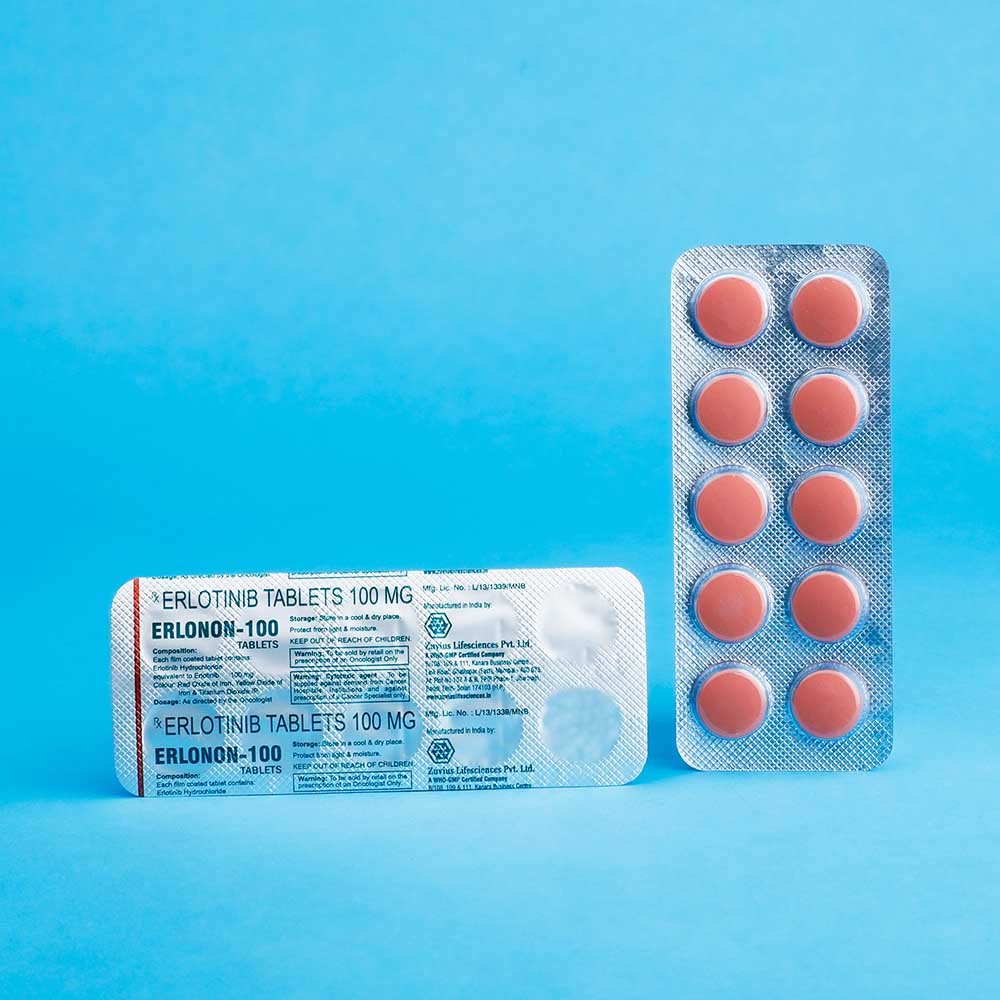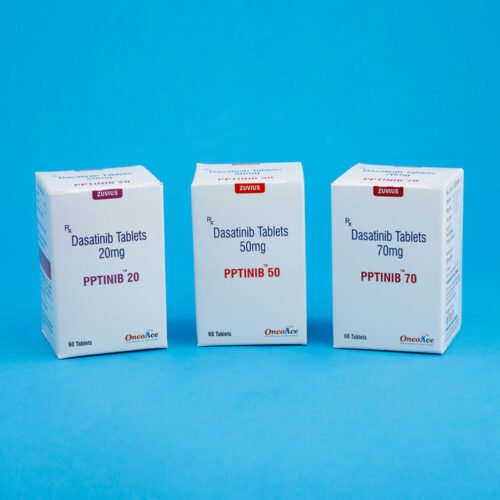Erlonon Tab
Erlotinib Tab
Strength: 100mg / 150mg
Pack Size: 1 x 10
Drug Class: antineoplastic agent protein kinase inhibitor
Dosage and Administration:
Selection of Patients with Metastatic NSCLC
Select patients for the treatment of metastatic NSCLC with Erlonon based on the presence of EGFR exon 19 deletions or exon 21 (L858R) substitution mutations in tumor or plasma specimens . If these mutations are not detected in a plasma specimen, test tumor tissue if available.
Recommended Dose – NSCLC
The recommended daily dose of Erlonon for NSCLC is 150 mg taken on an empty stomach, i.e., at least one hour before or two hours after the ingestion of food. Treatment should continue until disease progression or unacceptable toxicity occurs.
Recommended Dose – Pancreatic Cancer
The recommended daily dose of Erlonon for pancreatic cancer is 100 mg taken once daily in combination with gemcitabine. Take Erlonon on an empty stomach, i.e., at least one hour before or two hours after the ingestion of food. Treatment should continue until disease progression or unacceptable toxicity occurs
Cold Storage: no
Erlotinib is an inhibitor of the epidermal growth factor receptor (EGFR) tyrosine kinase that is used in the treatment of non-small cell lung cancer, pancreatic cancer and several other types of cancer. It is typically marketed under the trade name Tarceva. Erlotinib binds to the epidermal growth factor receptor (EGFR) tyrosine kinase in a reversible fashion at the adenosine triphosphate (ATP) binding site of the receptor. Recent studies demonstrate that erlotinib is also a potent inhibitor of JAK2V617F, which is a mutant form of tyrosine kinase JAK2 found in most patients with polycythemia vera (PV) and a substantial proportion of patients with idiopathic myelofibrosis or essential thrombocythemia. This finding introduces the potential use of erlotinib in the treatment of JAK2V617F-positive PV and other myeloproliferative disorders.
structural formula-:
Erlotinib is indicated for:
- The treatment of metastatic non-small cell lung cancer (NSCLC) with tumors showing epidermal growth factor receptor (EGFR) exon 19 deletions or exon 21 (L858R) substitution mutations
- In combination with first-line treatment for patients diagnosed with locally advanced, unresectable or metastatic pancreatic cancer
Usage-:
Erlotinib is used to treat certain types of non-small cell lung cancer that has spread to nearby tissues or to other parts of the body in patients who have already been treated with at least one other chemotherapy medication and have not gotten better.
Efficacy of erlotinib have not been established for patients with NSCLC whose tumors show other EGFR mutations.
Additionally it is not recommended for use in combination with platinum-based chemotherapy.
The safety of erlotinib have not been established for patients with NSCLC whose tumors show other EGFR mutations. Additionally it is not recommended for use in combination with platinum-based chemotherapy.
When considering the use of Erlotinib as a first line or maintenance treatment for locally advanced or metastatic NSCLC, it is important that the EGFR mutation status of a patient is determined.
A validated, robust, reliable and sensitive test with a prespecified positivity threshold and demonstrated utility for the determination of EGFR mutation status, using either tumour DNA derived from a tissue sample or circulating free DNA (cfDNA) obtained from a blood (plasma) sample, should be performed according to local medical practice.
If a plasma-based cfDNA test is used and the result is negative for activating mutations, perform a tissue test wherever possible due to the potential for false negative results from a plasma-based test.
Smokers
Current smokers should be advised to stop smoking, as plasma concentrations of erlotinib in smokers as compared to non-smokers are reduced. The degree of reduction is likely to be clinically significant (see section 4.5).
Interstitial Lung Disease













